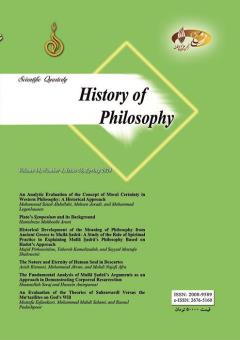The Nature and Eternity of Human Soul in Descartes
Subject Areas : Geneology of philosophical schools and IdeasAsieh Bistooni 1 , Mohammad Akvan 2 , Mahdi Najafi Afra 3
1 - PhD candidate of Philosophy, Islamic Azad University, Central Tehran Branch, Tehran, Iran
2 - Associate Professor, Islamic Azad University, Central Tehran Branch, Tehran, Iran
3 - Professor at the Islamic Philosophy and Wisdom Department, Islamic Azad University, Central Tehran Branch, Tehran, Iran
Keywords: eternity of the soul, immateriality of the soul, difference between the soul and boy, clear and distinct concept, Cogito, Descartes,
Abstract :
The soul is one of the most frequently used terms in Descartes’ philosophical works and one of the fundamental concepts employed in the structure of his philosophy. In fact, without considering the meaning and concept of the soul, one cannot perceive the essence of his philosophical system. He views the soul as an immaterial substance that is different from the body in the real sense of the word and can exist without the body. Descartes maintains that the soul is an essentially immaterial and decomposable substance that, after its destruction or the postmortem decomposition of the body, continues its life in the light of its essential immateriality bearing the memory of its union with the body. He has posed certain arguments on the immaterial nature of the human soul, such as the possibility of doubting the existence of bodies, the needlessness of the concept of the soul from corporal attributes, God’s power as to creating two elements with each one being clearly and distinctly perceivable, and the oneness and indecomposability of the soul. Accordingly, he believes in three substances of God, soul, and body in distinction from each other. He intends a true distinction when he refers to distinction of substances; however, this reference has become problematic for him, and he must clarify how two truly distinct substances can affect each other in unison. He has tried to resolve this problem by placing the vapor soul, the “pineal gland”, and the faculty of imagination as intermediaries or by establishing a kind of balance or even substantial unity between them. Nevertheless, the more he has tried to resolve the problem, the more he has been challenged. He has also presented two completely different standpoints regarding the eternity of the soul, which must be demonstrated based on rational and philosophical arguments. However, in his second stance, he introduces the mortality of the soul as a completely religious category and states that the eternity of the soul cannot be realized merely within the framework of the natural intellect and without seeking help from faith. Descartes has also been unsuccessful in this regard and failed to prove his claim.
احمدي، بابک (1381) هایدگر و پرسش بنیادین، تهران: نشر مرکز.
اکبری، رضا (1382) جاودانگی، قم: بوستان کتاب.
بریه، امیل (1390) تاریخ فلسفه قرن هفدهم، ترجمۀ اسماعیل سعادت، تهران: هرمس.
پاپکین، ریچارد؛ استرول، آوروم (1373) کلیات فلسفه، ترجمۀ سیدجلالالدین مجتبوی، تهران: حکمت.
دکارت، رنه (1369) تأملات در فلسفه اولی، ترجمۀ احمد احمدی، تهران: مرکز نشر دانشگاهی.
دکارت، رنه (1372) رساله گفتار در روش، ترجمۀ محمدعلی فروغی، بضمیمۀ سیر حکمت در اروپا، تهران: زوار.
دکارت، رنه (1376) انفعالات نفس، ترجمۀ منوچهر صانعي درهبيدي، تهران: الهدي.
دکارت، رنه (1384) اعتراضات و پاسخها، ترجمه و توضیح علی موساییافضلی، تهران: علمی و فرهنگی.
راسل، برتراند (1365) تاریخ فلسفه غرب، ترجمۀ نجف دریابندری، تهران: پرواز.
رحمانی، غلامرضا (1386) نظام فلسفی دکارت، قم: بوستان کتاب.
روژه، ورنو و دیگران (1372) پدیدارشناسی و فلسفههای هست بودن، ترجمۀ یحیی مهدوی، تهران: خوارزمی.
صانعی درهبیدی، منوچهر (1376) فلسفه دکارت، تهران: الهدی.
مجتهدی، کریم (1382) دکارت و فلسفه او، تهران: امیرکبیر.
Cottingham, J. (1989). Descartes. Oxford & New York, Basil Blackwell.
Descartes, R. (1991). The Philosophical Writings of Descartes, trans. by J. Cottingham, R. Stoothoff & D. Murdoch. 2 vols. Cambridge University Press.


